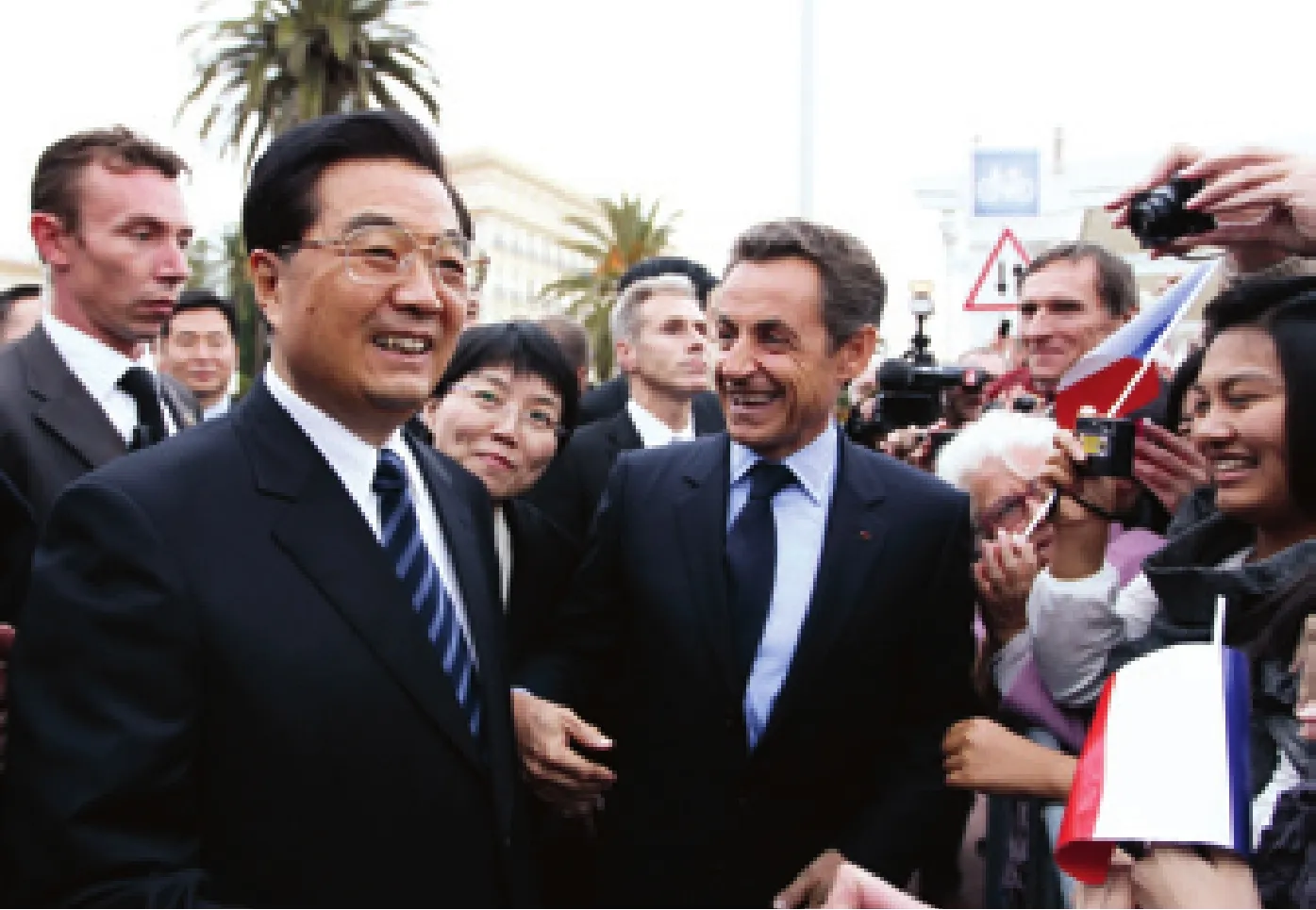Hu’s Visit Highlights EU Ties
2010-10-14ByDINGYING
By DING YING
Hu’s Visit Highlights EU Ties
By DING YING

GUEST OF HONOR: Chinese President Hu Jintao reviews honor guards at a welcoming ceremony in Lisbon on November 6, along with his Portuguese counterpart Anibal Cavaco Silva

ENTERPRISE VISIT: Chinese President Hu Jintao visits a production facility of the French energy management company Schneider Electric near Nice on November 6
President Hu Jintao’s recent European visit strengthens cooperation between China and the EU
Chinese President Hu Jintao’s trip to France and Portugal on November 4-7 helped strengthen China’s economic,political and cultural ties with the two countries and the entire EU.
The visit highlighted the importance of the Sino-French and Sino-Portugese relationships and the important economic links between the countries.
French visit
During the visit, China signed several economic cooperation agreements with France valued at about $20 billion. These included an order for 102 Airbus aircraft from France.
The China National Nuclear Corp. also signed agreements with AREVA, a large French nuclear power company. AREVA will supply 20,000 tons of uranium to China over the next 10 years at a value of $3.5 billion.
France also reaf fi rmed its readiness to cooperate with China in uranium mining, nuclear fuel production, nuclear power plant construction—including construction in third-party countries—and the processing and recycling of spent nuclear fuels.
China and France have already cooperated for 30 years in the fi eld of nuclear energy, with France being a major supplier of nuclear energy technology in China.
Trade and economic exchange is the centerpiece of the Sino-French relationship,said Wang Shuo, a researcher with the China Institute of International Studies (CIIS). Bilateral trade is expected to reach $40 billion by the end of this year. During Hu’s visit, the two countries announced a goal of doubling this fi gure to $80 billion by 2015.
France is experiencing slow economic growth, unemployment of about 10 percent and a budget de fi cit of about 7.5 percent. It is hoping to speed up its economic growth by “hitchhiking on China’s economic express,” Wang said.
“French producers, from motor producers to wine sellers, today all pay great attention to the potential of the Chinese market,” he said.
China’s GDP growth rate is expected to reach 10 percent this year, in contrast to 1.6 percent for France. Although France’s growth rate this year is an improvement over its dismal rate of minus 2.2 percent in 2009, the French president is still under heavy pressure to make improvements in the economic and social fi elds,Wang said.
Although economic cooperation may be the linchpin of the relationship, political considerations are also important to both sides.
Since France will host a summit of the Group of 20 (G20) major economies in 2011,it wants to make the summit successful, said Zhang Jian, Deputy Director of the Institute of European Studies of the China Institutes of Contemporary International Relations (CICIR).It wants to coordinate with China so the summit can achieve agreements on major topics such as reform of the international monetary system.
“China and France are obviously paying more attention to each other,” Zhang said. In his view, the frequency of high-level exchanges between the two countries reflects a growing common understanding. Hu’s visit marked the second meeting between the Chinese and French presidents this year. French President Nicolas Sarkozy visited China from April 28 to 30 this year.
The two countries are endeavoring to“build a new, mature and stable comprehensive strategic partnership based on mutual trust and mutual bene fi t and with a global perspective,”Zhang said. These same goals were highlighted in a joint statement issued by the two countries during Hu’s visit.

WARM WELCOME: Chinese President Hu Jintao meets residents of Nice, France,on November 5, while accompanied by French President Nicolas Sarkozy
France views China as an important partner because of similar views about the “future world order,” said Xing Hua, a research fellow with the CIIS. He said France traditionally has had a relatively independent view of international relations.
“China and France have a common language,” Xing said. “France hopes to play the role of a major nation in world affairs and it suggests giving emerging countries a greater say in international organizations. And China is a representative of emerging countries.”
Hu’s visit allowed the two sides to coordinate their positions in preparation for the G20 Summit in South Korea. By cooperating with France more closely at the summit,China would have a better chance to realize its conceptions of the world economic and political order focusing on peace and development, Xing added.
China and France announced plans to strengthen cultural and educational ties and encourage cooperation between local governments in the two countries. They also pledged to increase cooperation in science and technology.
As part of this effort, partnership between colleges and universities will be enhanced and study of the other country’s language will be encouraged. In addition,over the next fi ve years, 500 French young people will be invited to China.
Achieving “green growth” has become a goal for most countries, Xing said. Against this backdrop, China and France have a good opportunity to improve cooperation in environmental protection, as well as hi-tech and information industries.
Portugal visit
Hu’s visit to Portugal—the first visit by a Chinese head of state in 11 years—was marked by efforts to deepen cooperation between the two countries.
During the visit, Chinese and Portuguese telecommunications companies signed a cooperative agreement. China also promised to support the economic recovery of Portugal,which is still suffering from high unemployment and a high budget de fi cit.
In addition, the two countries pledged to double bilateral trade by 2015. Bilateral trade totaled about $2.4 billion in 2009.
Portugal is important to China, both for its position in Southern Europe and its in fl uence in Portuguese-speaking countries, said Zhang of the CICIR.
Portugal is also “very typical” inside the EU, he said. Agreements between the two countries can pave the way for reaching common understanding between China and the EU as a whole.
Hu’s visits to both France and Portugal were significant, said Zhang, because they helped enhance mutual trust and promote the development of a strategic partnership between China and the EU.
As an emerging economic and political power, China faces more criticisms and requirements from the rest of the world.Communication with other countries is therefore more important for China now than in the past, he said.
